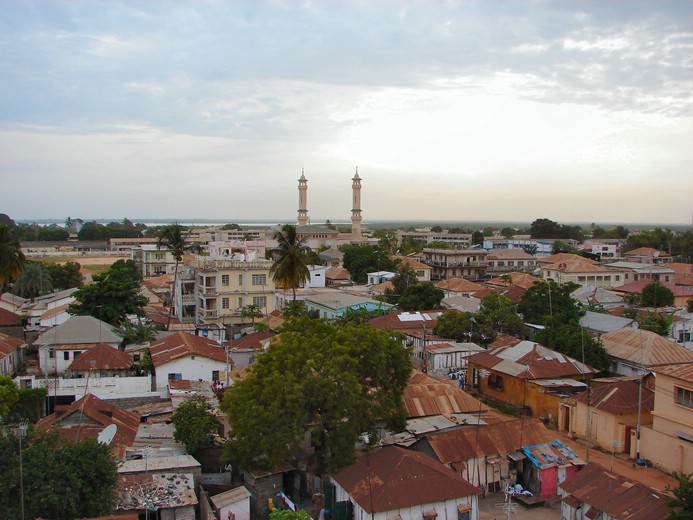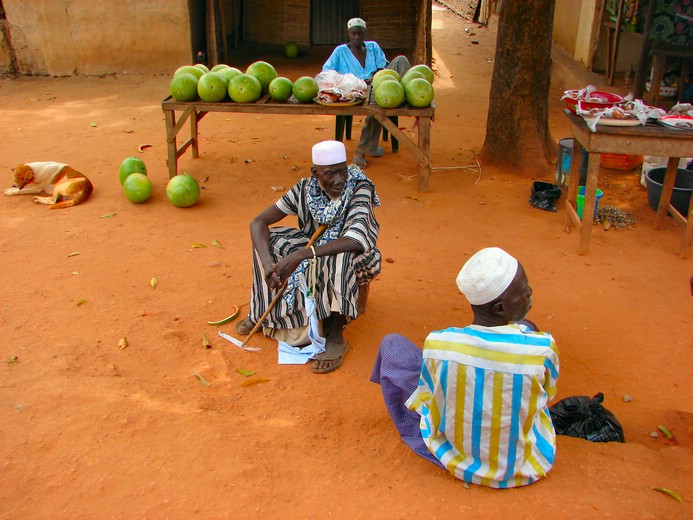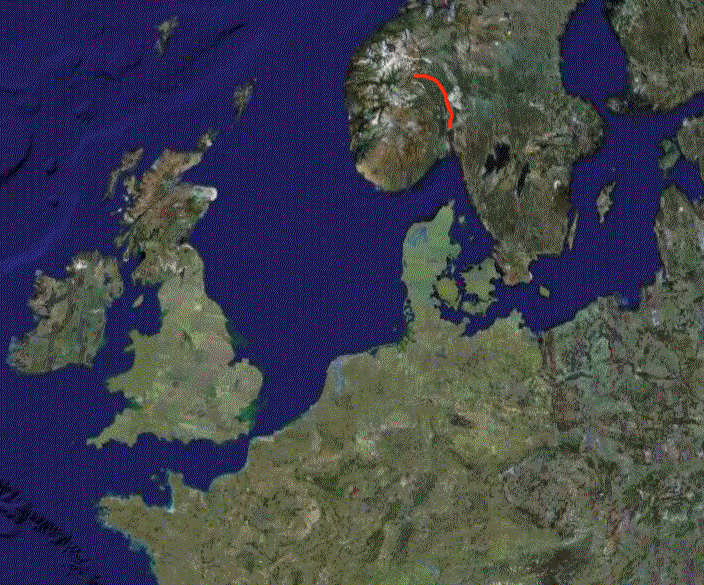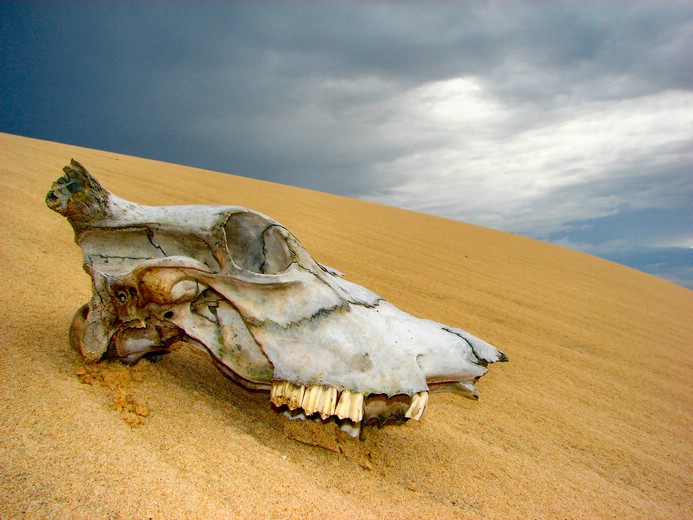Of course, much has changed during the two centuries since Mr. Park visited, but if you want to leave the hotel strip on the coast, visiting The Gambia can be quite strenuous, even today. "Come and mostly enjoy our edible foods", reads a restaurant advertisement in Banjul, the Gambian capital. Well put, I have to say.
 Banjul can be a scary place to visit, especially after dark. Not because of the crime rate. The man in absolute charge of the country for the last decade and a half, President Jammeh, knows that if people had weapons, they would use them on him. So as a tourist, there's not much reason to fear the people of Gambia. Unfortunately, due to poverty and a limited supply of electricity, after dark in Banjul really means in the dark. Add open sewers to that, and you get a city where walking around at night can be rather risky.
Banjul can be a scary place to visit, especially after dark. Not because of the crime rate. The man in absolute charge of the country for the last decade and a half, President Jammeh, knows that if people had weapons, they would use them on him. So as a tourist, there's not much reason to fear the people of Gambia. Unfortunately, due to poverty and a limited supply of electricity, after dark in Banjul really means in the dark. Add open sewers to that, and you get a city where walking around at night can be rather risky.I decided to leave the capital and go up the river. There was no public transportation by boat available, so this meant I had to travel by car. I spent two full days doing so, although I wasn't actually moving for more than about six or seven hours. This took me just 120 kilometers inland, but it left me feeling as if I had crossed the continent. And I was a world away from the tourist beaches on the coast. The journey didn't cost much, apart from some blood, sweat and tears - and lots and lots of patience.
From Banjul, you first have to go to Bundung Garage in Serrekunda. There are no scheduled buses in The Gambia, hence there are no bus terminals either. Instead they have bush taxis. These vehicles are usually in a condition that makes it sensible to call the place where their passengers can find them, "Something Garage". You have to be there early in the morning because that's when the bush taxis leave. I wasn't going very far (by any non-Gambian standards), so I figured that leaving around noon would be suitable. I was wrong.
At the garage, I found a 30-seat vehicle waiting for more passengers. The driver needed an additional 25 before he would find it environmentally or, more probable, economically sensible to set off. One hour later we were still 25 short. I sort of gave up on getting anywhere that day, but I stayed put. In a poor country like The Gambia, you can't really comfortably walk around and look at how people live. But you can sit and wait for a bus that will never leave, and simultaneously look at how people live.
I was the only ghost face around, and the locals found much entertainment in me. They kept pointing at me and telling funny facts about foreigners to each other. The children would sneak up on me and caress the "fur" on my forearms. To many of them I must have been the first monkey man they could experiment with at such close range. I guess evolution long ago removed all heat-inducing mechanisms, including body hair, from the Gambian gene pool.
The driver spent the day sitting in the shadow of his car, chatting, drinking hot tea and smoking marijuana. His name was Sambo Dumbo, and I'm not even making that up!
Among my co-waiters were two old women who were coughing in a most tuberculous way. In the end I concluded that getting in that car would probably kill me one way or the other. So I didn't. Instead, I went back to the beach for a late afternoon swim, and I promised myself to get up earlier the next day.
This worked out well. When I returned at dawn, the car was still there, but the driver had been replaced with a more sober one. The two old women had probably died during the night. At least they were gone. At eight o'clock we had a full car and got going. That's when I discovered that the ticket was cheap enough that I could have bought all the tickets the day before and had the bus take off whenever I wanted to. Of course, demonstrating my relatively speaking insane economical powers like that, would not be to show good manners.
We drove for a full three minutes before the driver stopped at another garage. Our tires desperately needed more air. I'm not entirely sure why he couldn't have arranged that during the day and a half he had been waiting for passengers, but there may well have been a good reason for it. Maybe. Then we drove for another five minutes before we stopped for fuel. For the rest of the drive, we also stopped every thirty minutes or so, to fill up on water for the car radiator. I'm not complaining, mind you. I'm just saying that going by bush taxi in The Gambia isn't necessarily a quick way to get around.
In some countries, the traffic is so bad that your chances of survival are best if you sit in the back of any moving vehicle. In The Gambia, I figured I would be better off bribing the driver with a dollar or so to get the seat next to him. That's the only way I could have a good view of what went on outside. It was completely safe. The driving was so slow that there was no risk of a collision with anything bigger than a snail.
 That said, we DID drive off the road more or less all the time. But that was just because ironically, the road conditions were most of the time better there than on the actual road. It's just ridiculous how bad the roads are in The Gambia. The only place a pedestrian there can feel safe is in the craters in the middle of the roads! Gambian stray dogs seemed to know this. They spent their days sleeping on the road, waiting for night to come, when they would wake up and start their tireless howling.
That said, we DID drive off the road more or less all the time. But that was just because ironically, the road conditions were most of the time better there than on the actual road. It's just ridiculous how bad the roads are in The Gambia. The only place a pedestrian there can feel safe is in the craters in the middle of the roads! Gambian stray dogs seemed to know this. They spent their days sleeping on the road, waiting for night to come, when they would wake up and start their tireless howling.Anyway, I sat in the front where I could see what The Gambia was like. It's a flat country. All I saw was what was on or right next to the road, which wasn't much. At least I learned that most people appeared to spend their days sitting in the shadows of trees, scowling at the occasional passing car that showered them in a red cloud of dirt and sand. The locals weren't difficult to cheer up, though. All I had to do was look like a badly sunburned whitey and wave at them, and they would immediately beam their white teeth in a smile back at me.
The numerous police and roadside soldiers didn't smile much. Typically because it had been seventeen months or something like that since the President last paid them their salary. They did, of course, need some money to survive, so they cashed in on just about every vehicle that passed by. They didn't want much, but they took their time getting it. It seriously delayed our progress.
I had been warned about this, so I had brought some small notes to pay the various fines I was given. The crimes I committed ranged from sitting with my backpack in my lap to not being able to explain exactly which coastal village in northern Norway I had been born in. Soon I didn't bother with putting away my passport and my yellow fever vaccination card, as I was asked to show them at every stop we were forced to make.
I soon was taught not to photograph anyone wearing a uniform. They're not that photogenic anyway, but the main reason to refrain from doing so, the driver told me, was that I risked being arrested. Apparently, taking photographs of the police is what a spy will do. And although I can't imagine why a spy would photograph the slumbering, corrupt police of The Gambia, this would probably not keep me out of jail. And there are better ways to spend your time in The Gambia than in one of the local jail cells. On the other hand, there are certainly worse alternatives as well, but I'll save that for another story.
Briefly, a relatively short ride in a Gambian bush taxi can be quite eventful, in an extremely slow kind of way. I do recommend it, at least as a once-in-a-lifetime experience.
If you want to see more photos and read about travelling in The Gambia and Senegal, please visit my West Africa gallery.
(This article is my own work, and it featured on the Boots'n All Web site in May 2008.)






